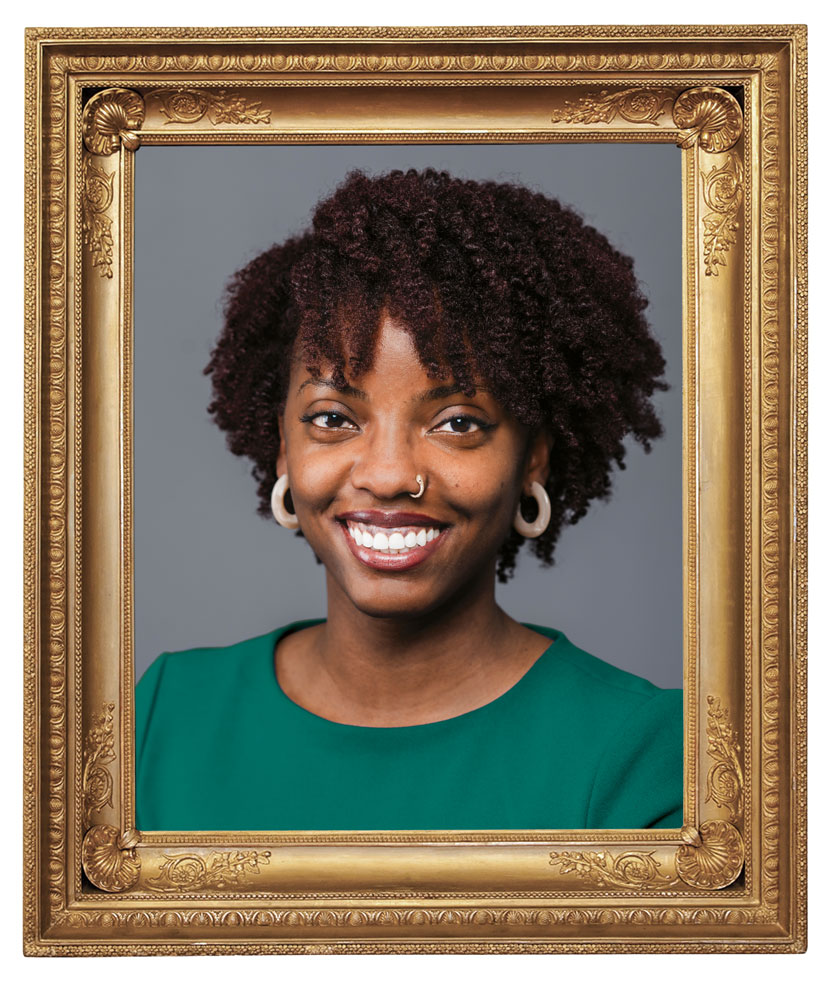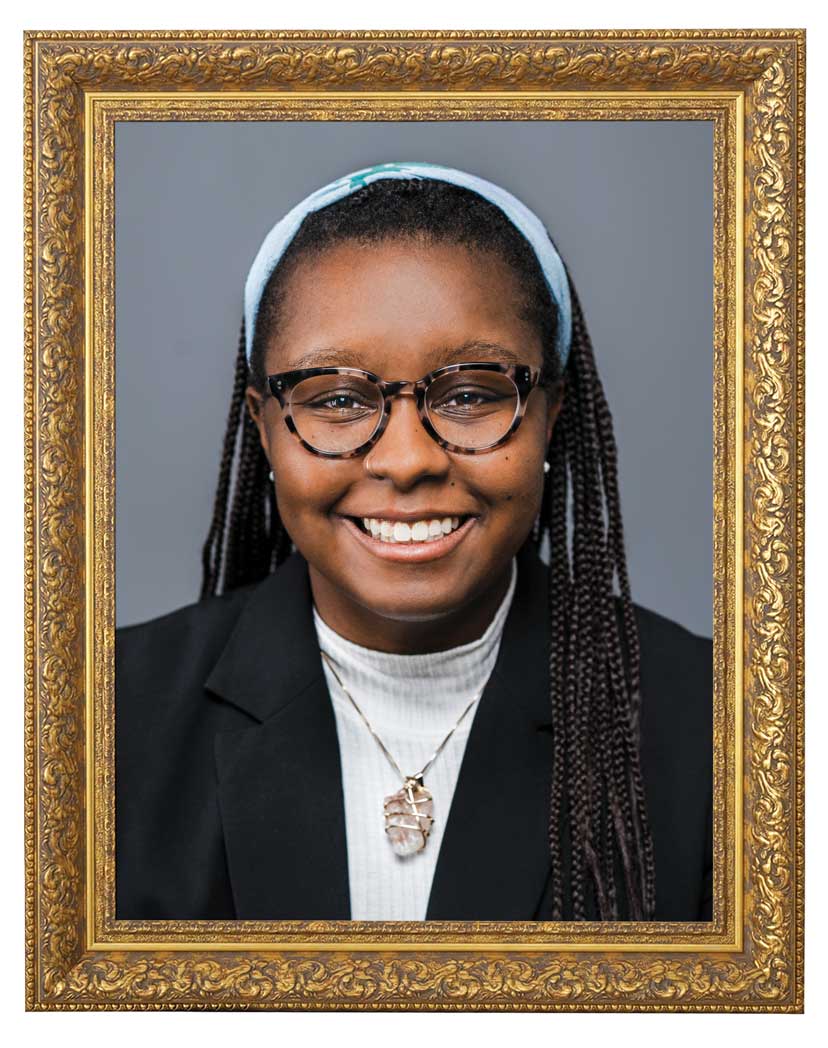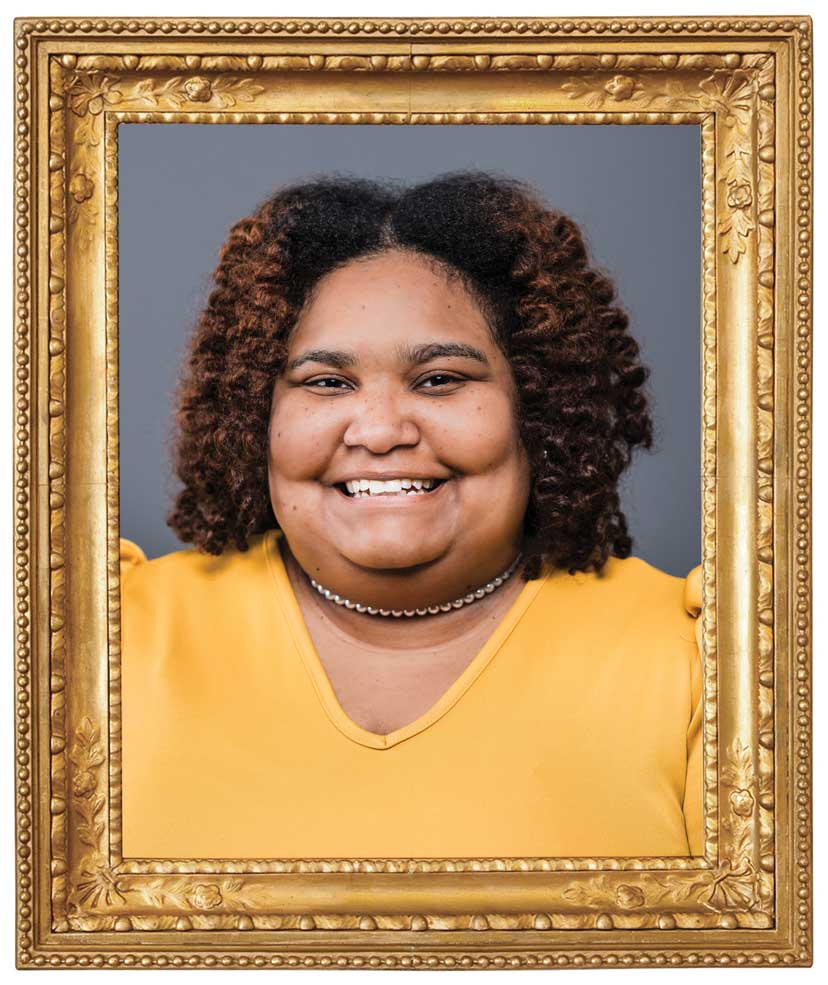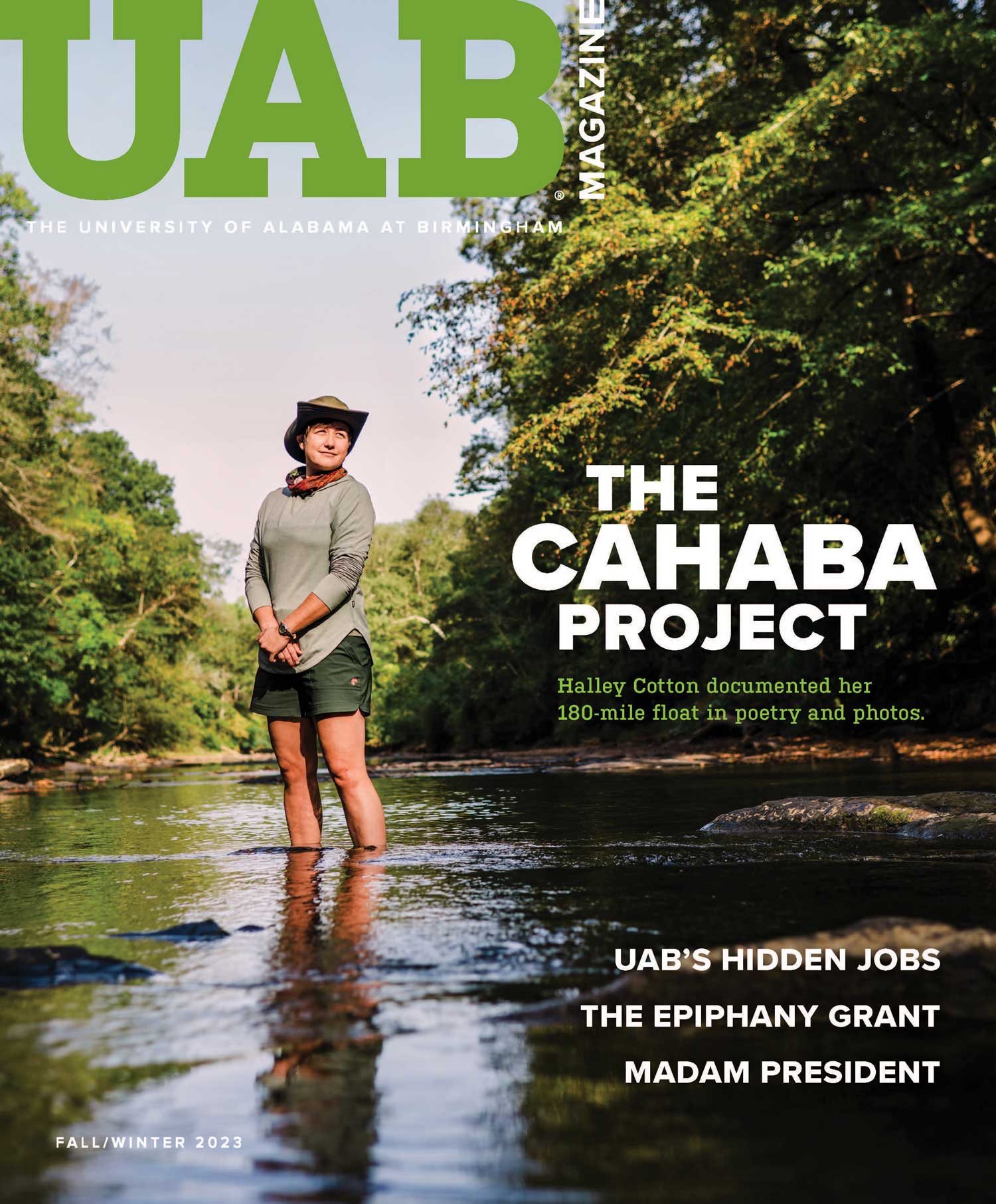Sade Williams Clayton, Ph.D.
President, 2019–2020
Rita Levi-Montalcini Post Doctoral Fellow in Regenerative Medicine, Washington University St. Louis

This summer, Clayton spoke to the GROW at UAB group in the Graduate School for its My Story series. (GROW stands for Graduate Resilience, Outreach, and Wellness.)
“I had to be self-reliant from an early age,” Clayton said. “The only thing I could do is read; I poured myself into places I thought I would never see.” School opened up another world. “I knew that education was freedom,” Clayton said. “I was going to get out of this small town and go to college.”
Clayton was the first high school honors graduate in her family and the first to attend college. “I got accepted to my top choice, the University of Georgia—which was good, because I could only afford to fill out one application,” she said. But the first two years of college were “culture shock,” Clayton said. “I had no motivation, I was isolated from friends, was anxious and stressed, and I struggled in my classes.” She lost her state Hope Scholarship and, unable to pay her bills, “I got kicked out of school,” she said.
Clayton went home, exhausted and defeated. “I tried,” she thought. “It wasn’t in the cards.” But her family was not willing to let that be the end of it. They banded together and paid the $3,000 bill that would allow her to go back to college. “We weren’t a hugging family,” Clayton recalled. “Acts of service are how we express love. I was driving in the car with my cousin, and she said ‘We got you. We will get you back in that school.’ They believed in me. They were proud of me. I felt like God was giving me a second chance.”
Clayton took every advantage. “I asked for help,” she said. She switched her major to cell biology, which “allowed me to take specialized courses and enjoy science,” she said. “Developmental biology is what changed my life.” She excelled in her classes, made the dean’s list and decided to go to graduate school. She applied to several programs; during her interview at UAB, she met Maigen Bethea, who was then a second-year student in the Graduate Biomedical Sciences program. “She is also a Black woman,” Clayton said. “When we talked, what I heard was, ‘We’re in this together.’”
Clayton determined to do the same for younger students. “I want to pour into people and love on people,” she said. She also was out to prove that the poor grades from her early undergraduate career did not define her. “I had a 4.0 GPA in graduate school,” Clayton said proudly.
That’s how she met her best friend, Jazmine Benjamin. “High-performing students are asked if they want to be tutors, and Sade was heavily involved,” said Schneider. “She was a really great tutor for the advanced genetics course.”
Shaurita Hutchins also got to know Clayton in the same way. “My mom had gotten sick in September, just after I started graduate school, and I was having a difficult time,” Hutchins said. “I reached out to her to ask how I could do better in the class and she said, ‘I know you are going through a lot. Grad school is really hard and people aren’t always going to have that grace for you. But just know that you can do this. Grad school doesn’t stop and neither does life, so you have to find a balance.’ Any time I think things are going crazy, I try to put them into perspective: How do I move through this, sort it out, and not let it send me into a spiral?”
“You come in with your own mission that fits in with the scope of GSG. Mine was advocacy work. Community is a big thing for me.”
—Sade Williams Clayton, Ph.D.
After a few years of graduate school, Clayton decided she was going to pull back and focus on her studies. But the GSG president at the time, Nirzari Gupta, would not take no for an answer. “She saw that I really enjoyed professional outreach and leadership,” Clayton said. “She encouraged me to be president.”
Each GSG president has leeway to develop their own agenda. “You come in with your own mission that fits in with the scope of GSG,” Clayton said. “Mine was advocacy work. Community is a big thing for me: How can I foster community, to make people feel less isolated and alone?”
She has continued to do that at Washington University in St. Louis, even though she had told herself that she was done starting organizations.
Soon after she arrived, she founded Wash U’s first Black postdoctoral association, the WUSTL Black Postdoctoral Association. “I couldn’t help myself,” she said. “Sometimes you have to create the resources you need.”
After her postdoc, Clayton aims to secure a tenure-track faculty position. “I would love to come back to UAB,” she said. “My ultimate goal is to be able to create pathways to make this process easier for underrepresented students interested in research. I could see myself as an associate dean of diversity, equity, and inclusion and vice president of research.”
Jazmine Benjamin
President, 2020–2021
Doctoral student, Graduate Biomedical Sciences, studying sodium dependent and independent mechanisms of blood pressure control in the lab of Professor David Pollock, Ph.D., in the Division of Nephrology

Although they grew up only about 20 minutes apart in eastern Georgia, Clayton and Benjamin did not meet until graduate school. That is not where Benjamin thought she would end up.
“I was really interested in science and research as a kid,” Benjamin said. She grew up in a military family; they were stationed in Columbus, Georgia, when she was born, but later moved to Augusta. “When I graduated from high school I wanted to be a fashion designer, but I settled on being a surgeon to make money,” she said. “My heart wasn’t in it.”
Still, she majored in biology as an undergraduate at the University of South Carolina Aiken. During one class, a teacher who saw her promise suggested she go to graduate school instead of medical school. “That was my junior year,” she said. “I had to play catchup.” Her choice to enroll at UAB was late in coming, too, “but it’s not one I regret at all,” Benjamin said.
“I met Sade during my first year” in the Graduate Biomedical Sciences program, Benjamin said. “She was a tutor for one of my classes and the lab I joined was right next door to her lab. She would come and ask to borrow something and the friendship developed from there.”
After Clayton became president of the Graduate Student Government in 2019, she recruited Benjamin to join her as chief of staff—a role that Clayton created. “I was her understudy,” Benjamin said.
Benjamin had a particularly difficult task as GSG president. She took office just as the COVID pandemic was at its most frightening in spring 2020 and held the post for two consecutive year-long terms. “They were two very interesting, fast-paced years,” Benjamin said. “There was a steep learning curve, but I got to see the inner workings of how UAB was able to get safely back on campus and back to some semblance of normalcy. I got to talk to Dr. Faircloth [Michael Faircloth, M.D., director of UAB Student Health Services] very candidly about what was going on in the hospital, in student housing. That is something that I would have been out of the loop on at any other time, and it was comforting that my voice was being considered.”
“There was a steep learning curve, but I got to see the inner workings of how UAB was able to get safely back on campus and back to some semblance of normalcy.”
—Jazmine Benjamin on being GSG president during the covid pandemic
When she was president, Benjamin kept in regular touch with Clayton. After her time in office, she did the same for Massey-Sims and now Hutchins. “We have kept a contact chain going,” Benjamin said. “If you need to remember someone’s name or the proper channel to go through.”
Benjamin, who is graduating in December 2023, is going on to a postdoc position at Vanderbilt University. She has a long-term goal of being involved in advocacy. “I cofounded the Science Policy and Advocacy Initiative here at UAB” with former Graduate Biomedical Sciences student Adrienne Samani, Ph.D. “I was also a graduate fellow for the Alabama chapter of the Scholars Strategy Network,” founded by faculty members Peggy Biga, Ph.D., in the Department of Biology, and Peter Jones, Ph.D., in the Department of Political Science and Public Administration, she said. “I was a graduate fellow for them up until last year and was able to see that from the ground up.”
“As a scientist, almost everything I do will touch on matters of policy,” Benjamin said. “Politics is a little too fast-paced for me, but I am continuously interested in how it works.”
Autumn Massey-Sims
President, 2022–2023
MBA student, Collat School of Business
Compensation analyst, UAB Human Resources

For Massey-Sims, a Birmingham native and full-time UAB employee for the past four years, graduate school is a family affair. “My mom went to UAB for undergrad and for her MBA, and my sister also is in the MBA program,” she said. “My sister works in HR as well, in Talent Acquisition, and my mom works in the School of Medicine.”
It was her mother’s experience that convinced Massey-Sims to go back to school. “I’m a very big family person,” she said. “I saw how having the MBA helped elevate my mom’s career, which inspired me to follow in her footsteps.”
But despite being in a familiar place, Massey-Sims realized she needed more than her employee experience to make graduate school a success. “I started during the pandemic, so I was really looking for ways to connect and be around other students, find out what was going on around campus and get help navigating the pandemic,” she said. “I had been very involved as an undergraduate student and I was looking for organizations specifically for graduate students.”
That led her to GSG. “We’re an organization that represents the entire graduate student body—every student is a member,” Massey-Sims said. “All students are invited to all of our meetings and there is an open floor. We have a monthly meeting with the provost. The administrators are always really helpful and if they do not know an answer they will provide you with a contact who can help.”
When Massey-Sims first joined GSG, she was a senator from the Collat School of Business. “The number of senators is based on enrollment,” she explained. “That changes annually. But even if you are not a senator, you are still a part of the GSG family.”
“They have really paved the way for me to come in. To be a part of this group and legacy with Shaurita is quite something.”
—Autumn Massey-Sims on following Sade and Jazmine as GSG President and preceding Shaurita
Massey-Sims presided over the return of GSG to in-person events. One of the highlights of her term, she says, was creating two new positions—a health and wellness officer and an international student liaison. During her term, the GSG also restructured its senate “to make sure we are getting more people from a variety of schools and backgrounds,” Massey-Sims said, and “rolled out a new allocation model for student group funding.”
Following Clayton and Benjamin in the GSG presidency has been “phenomenal,” Massey-Sims said. “They have really paved the way for me to come in. To be a part of this group and legacy with Shaurita is quite something.”
“We’re an organization that represents the entire graduate student body—every student is a member. All students are invited to all of our meetings and there is an open floor.”
—Autumn Massey-Sims
Massey-Sims says that her long-term career goal is to eventually become director of human resources in an organization. “It would be lovely if that organization was UAB,” she said. “I have been a student, alumna and now employee here. It would be an honor.”
Finding Her Path
The Current GSG president looks back and forward
Shaurita Hutchins
President, 2023–2024
Doctoral student, Graduate Biomedical Sciences, studying rare disease genomics in the lab of Elizabeth Worthey, Ph.D., director of the UAB Center for Computational Genomics and Data Science
Hutchins hails from West Point, Mississippi. After graduating from Xavier University of Louisiana in New Orleans with a degree in biology in 2010, and a master’s degree in biological sciences from Mississippi College in 2012, she worked as a researcher at the University of Mississippi Medical Center in Jackson, first in the center’s cancer institute and then in the Department of Psychiatry and Human Behavior.
She credits her lab’s principal investigator, Eric Vallender, Ph.D., with “setting us free,” Hutchins said. “He was very empowering to allow me to explore learning and programming,” she said. Vallender also “inspired me to apply to UAB,” Hutchins said. “He knew some people who had been here and felt it was a good place for me. And he was right.”
Hutchins had her graduate school interview at UAB in March 2020. “A week later, everything shut down, including my job,” Hutchins said. “I got accepted and had to decide if I would come or not.” Hutchins went home to visit her mother, who was struggling with an illness that would eventually lead to her death. “She was very supportive of me going to graduate school,” Hutchins said. “She said, ‘You need to go study.’”
Hutchins started classes in fall 2020, “when everything was remote,” she said. “People in my year, we always look at that and say, ‘We survived it, so we can survive anything.’” The lost time around COVID helped spark an intense desire to surround herself with a support system, Hutchins adds. “I just wanted to do anything and everything—meet people, explore Birmingham and create my family here,” she said. Hutchins’ lab mate encouraged her to join the Informatics Club, which remains a ruling passion for her, she says, and she became part of the Black Graduate Student Organization and Student Advocacy Board. After she was nominated for professional development and leadership chair with the GSG, Hutchins talked with Benjamin “about what GSG does and I said, ‘This is right up my alley.’”
“Jazmine was very encouraging,” Hutchins said. That was important to her, because “for a lot of us incoming students, especially the 2020 cohort of GBS students, Jazmine was someone we all looked up to as a student leader, who encouraged others to get involved. I look at her and say, ‘If I can be a grad student like that, I will have done a good job.’”
As Massey-Sims was finishing her term as president, she encouraged Hutchins to consider taking on the role. “Autumn was saying, ’Shaurita, we need someone,’” Hutchins recalled. “‘You have the skills and I think you should do it.’” Her best friend, Hailey Levi, was nominated for vice president. “We didn’t plan that,” Hutchins said. “But we were talking about it and said, let’s go for it. And thankfully we have a lot of returning officers, so there is a lot of continuity.”
During her term as president, “the number one priority is student advocacy,” Hutchins said. She would like to create a GSG Emergency Fund to assist with non-medical emergencies. She also would like to make “tangible improvements in access to mental health for graduate students a priority.” Another priority is to make sure that graduate students “feel part of a community,” Hutchins said, “to create this environment where students feel they can speak about issues, where they are a part of something bigger.”
Hutchins said that her goal, post-graduate school, “is to go into industry for a little bit.” Long-term, “I really want to be part of shaping the ethics of using big data in genomics,” she said. “I see being in public health policy and shaping those conversations and making sure that all people are adequately represented. I think there’s a path there.”
“[I would like] to create this environment where students feel they can speak about issues, where they are a part of something bigger.”
—Shaurita Hutchins



